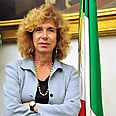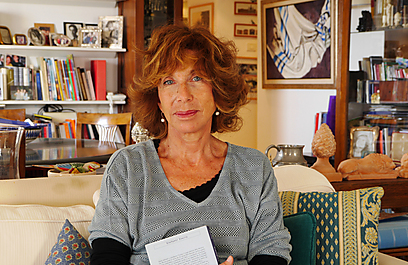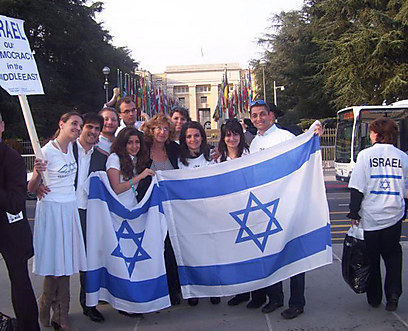
Ex-Italian MP marks 1st Sukkot in Israel
Fiamma Nirenstein was born in Florence, served as parliament member in Rome, until one bright day she decided it was time to make aliyah. While she still misses her previous life, she is joyful to be able to 'celebrate a holiday for the first time with my family, with my people, in my country'
She was born in Florence, lived in Rome, served as a parliament member on behalf of Silvio Berlusconi's conservative party (and filled a number of senior roles in his government) – and then, one bright day, she decided that it was time to leave Italy behind and make aliyah.
In her new apartments in Jerusalem's Gilo neighborhood, overlooking the capital's mountains, Fiamma Nirenstein is experiencing Israeliness. The woman who was, and still is, one of the most outspoken activists in the war against anti-Semitism and anti-Israel propaganda, has changed her address to the place where she feels most at home in: The State of Israel.
'For the first time I felt part of it too'
As part of the preparations for the holiday, Nirenstein cooks food with scents "from there" in an atmosphere of "here."
"My sister, who lives here, and her daughters will be our guests during the holiday," the new immigrant says proudly. "On the one hand it's so much fun having them here, but on the other hand I feel a bit sad because my son is still in Rome, and it's hard to celebrate this family holiday without him."

Nirenstein. 'I like the holiday shopping here'
Like every Israeli, Nirenstein visited her local supermarket on the eve of the holiday, filled her cart with all the best products, and waited in the long queues.
"I like shopping here," she says openheartedly, "because it feels like being with everyone. I walked around the Sukkot stands, with the ornaments and the Four Species. I am not religious, but I relate to this cultural aesthetics. The happening around the holidays, the atmosphere, and for the first time I felt I was part of it too."
Nirenstein is still enthusiastic about the small, obvious details. "During the holidays there, we always had to update people in advance that it's the holiday now and that I'm on vacation, and get reactions like, 'Oh, really?' Building a sukkah and hearing your non-Jewish friends praise the 'nice hut.' Visiting the ancient synagogue in Florence and meeting the community, while the street around us is in another routine day.
"In Israel you don't have this alienation and there is a holiday atmosphere for a change, and I feel I am celebrating my holiday."
She even finds a lot of symbolism in the fact that the first holiday she marks as a new immigrant describes wandering and temporariness.
"The whole building of the sukkah, after all, is to remember the wandering in the desert. But this wandering, as you know, did not end there. We are a wandering people. It's part of the Jewish story. On the one hand wandering, and on the other hand, even in the most temporary place you're in, turning it into a home and a family."
Making Europeans listen
Nirenstein was born to a mother from a Jewish Italian family and a Jewish father of Polish descent. She has dedicated most of her adult life to connecting Italians to Israel and the Jews.
During her four-year term in the Italian Parliament, Nirenstein managed to inaugurate a special committee for combating anti-Semitism, encourage Italian lawmakers to participate in pro-Israel rallies, and give interviews to every European news outlet about Israel's right to defend itself in the face of terror.

'Being an immigrant is living with mixed feelings'
Even while adapting to the new country, she is always on the go. Since leaving the Italian parliament, she has gone back to her previous job as a journalist and author of history and culture books about the Middle East, while writing a daily column from Israel for Il Giornale, one of Italy's leading newspapers.
Nirenstein also serves as a member of the Genesis Prize committee for unusual contribution to humanity linked to Jewish values, and continues to lecture and speak for Israel around the world. The former politician is especially helping with the European boycott issue, as a person with the rare ability of making the Europeans listen.
Heart in Jerusalem, Florence
Meanwhile, Nirenstein is getting used to another basic fact of living in Israel: The wonders of Israeli bureaucracy.
"I was surprised to discover that I have to pass a driving test again to get an Israeli driving license," she says. "As a person who has been driving for years, and very well, it was somewhat absurd and delusional.
"I do meet a lot of nice and courteous people everywhere. The moment people hear that I am a new immigrant, I see a lot of good will to help, as well as unconditional acceptance."
And how do you see yourself integrating here in the foreseeable future?
"I want to be useful. It's very important for me to make a contribution, from what I can and from my experience, in favor of the residents of the State of Israel. In Italy I have always spoken in favor of Israel, and now that I'm here, it's a different angle.
"It's a bit hard for me, as a person who grew up in the home of journalists and academic intellectuals, not to be able to read well in Hebrew. I feel illiterate when I have to write – and I don't really know how," she says with the sincerity of a person who speaks quite a few languages.
Since making aliyah, the former parliament member uses every available moment to tour the city which she now calls home, Jerusalem. Every such rare moment is dedicated to a meeting with another street or alley in Israel's capital.
"The resemblance is sometimes deceiving between the ancient part of Florence and Jerusalem's narrow streets, and it feels like home for me in a double and special way.
"Both of them are part of me, I am the daughter of two cities. But eventually, with all appreciation for the beauty and synergy – what pinches my heart is belonging. The feeling that this place is also mine, that it's part of me.
"Being an immigrant is living with mixed feelings. On the one hand, memories from the previous life I left behind, and on the other hand, taking a deep breath and accepting the overwhelming fact that I have fulfilled a dream, and holding on to that and to the great happiness it gives me to be able to celebrate a holiday for the very first time with my family, with my people, in my country."










